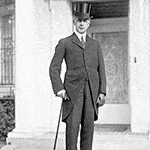
Mahlon Pitney (1912-1922)
Mahlon Pitney lived from 1858 to 1924.
Early Life
Pitney was born in Morristown, New Jersey. He attended the College of New Jersey (now Princeton University) with Woodrow Wilson. After graduating in 1879, Pitney began reading law in his father’s law office and passed the bar exam in 1882. He began his own private practice in Dover, but then returned to Morristown to acquire his father’s law firm. Pitney married Florence Shelton in 1891, and the two had three children.
Legal Career
Pitney successfully ran for the United States House of Representatives in 1894. He defeated the incumbent, Johnston Cornish, winning a seat in the 4th congressional district, where he served two terms. Pitney was also involved in local New Jersey politics. He served as chairman of the 1895 state Republican convention, and pushed for the gubernatorial nomination of John W. Griggs.
In 1898, Pitney resigned from the House to run for election to the New Jersey Senate, which he won. While in the state legislature, he served as the Republican party floor leader, until becoming Senate President in 1900. One year later, in 1901, Governor Foster M. Voorhees appointed Pitney to the New Jersey Supreme Court. After seven years, Pitney was elevated to the role of Chancellor of New Jersey.
Appointment to the Supreme Court
President William Howard Taft appointed Pitney to the United States Supreme Court in 1912. Pitney’s nomination was opposed by progressives in the Senate, but he was eventually confirmed by a 50-26 vote.
During Pitney’s tenure on the Court, he strongly supported substantive due process rights. For example, in his majority opinion in Coppage v. Kansas, the Court struck down a Kansas statute banning anti-union yellow-dog contracts as unconstitutional. The Court found that the states’ police power could not be legally used to ensure equality of bargaining power. Pitney also wrote the majority opinion in New York Central Railroad Co. v. White (1917), in which the Court upheld a New York state workman’s compensation statute, laying the foundation for the expansion of these statutes across the nation. In 1922, after suffering a stroke, Pitney was forced to resign from the bench
Death
Pitney died on December 9, 1924 in Washington, D.C. He is buried in Evergreen Cemetery, in Morristown, New Jersey.
Notable Cases
Coppage v. Kansas (1915)
New York Central Railroad Co. v. White (1917)








